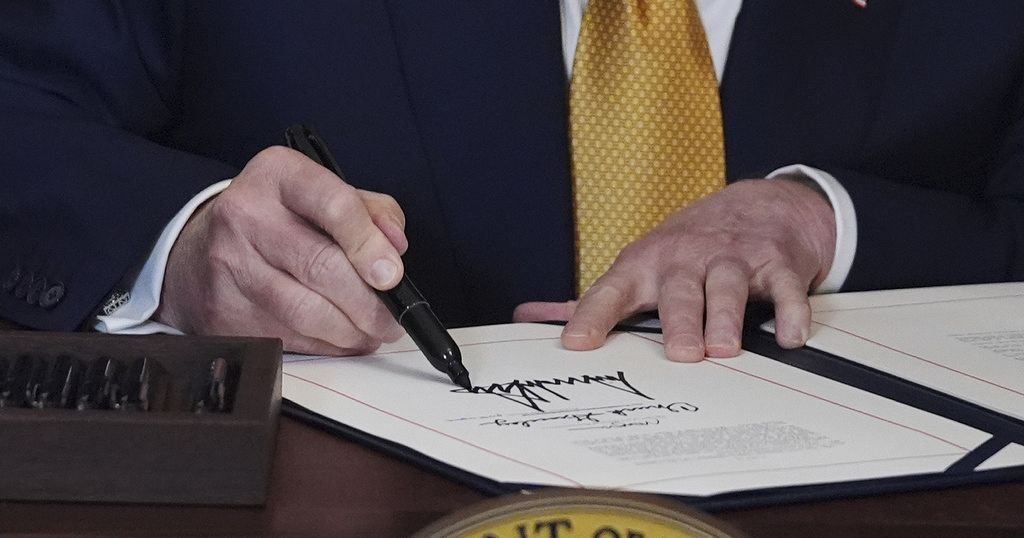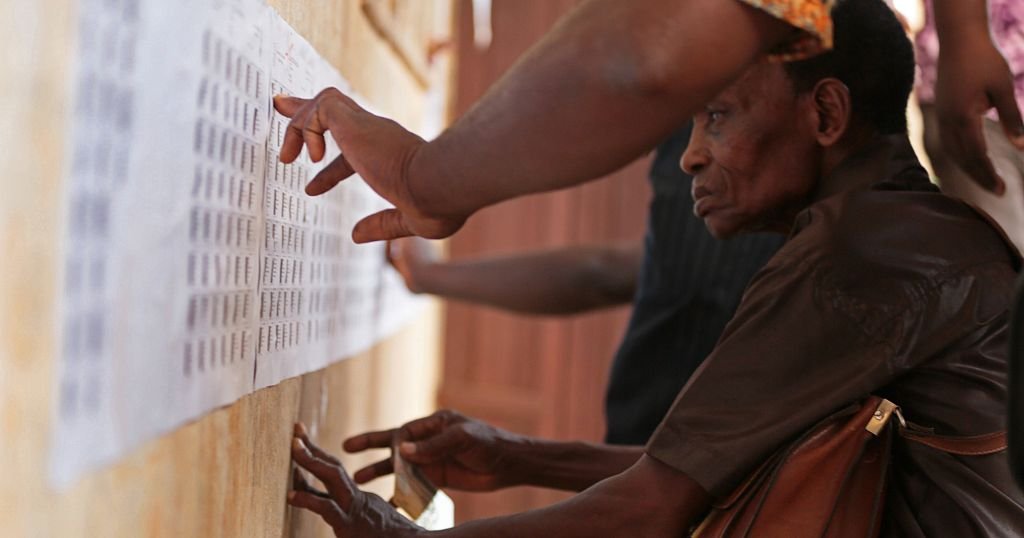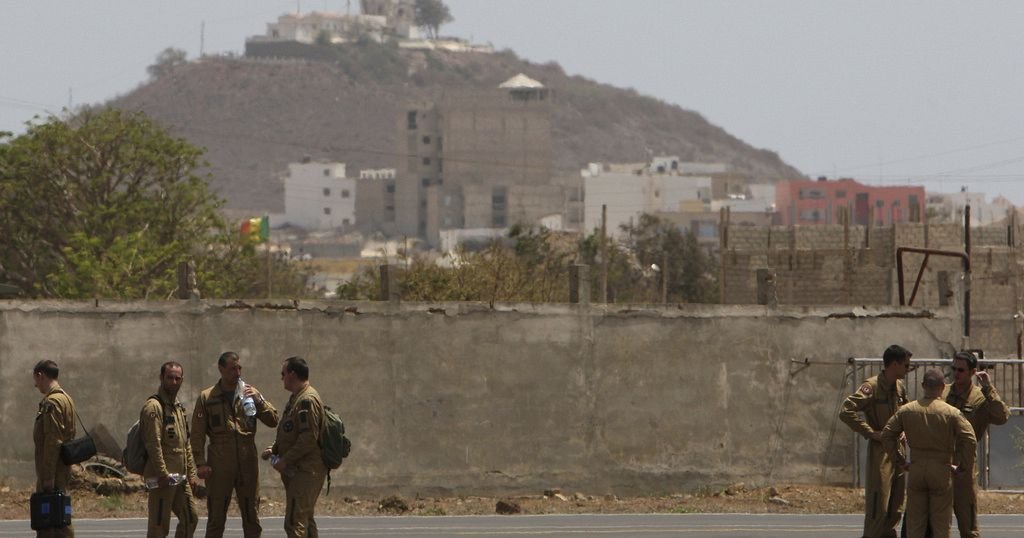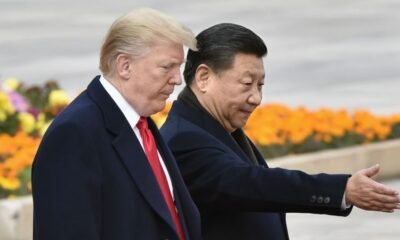Africa
New US law targets fentanyl-related copycat drugs driving overdose deaths

US President Donald Trump has signed into law a bill aimed at quelling the fentanyl crisis sweeping America.
The law targets all fentanyl-related drugs, including copycat versions of the potent opioid that evade current US regulations.
Illegal forms of the drug, often made in China, have been driving US overdose deaths for years.
“With this bill, we are officially and permanently classifying all fentanyl related substances as Schedule 1 narcotics, which is actually a very big deal,” Trump said at a signing ceremony at the White House on Wednesday.
“That doesn’t sound like much. It’s a big deal, as they will tell you. Meaning, anyone caught trafficking these illicit poisons will be punished with a mandatory ten year minimum sentence in prison. We’ll be getting the drug dealers, pushers and peddlers off our street and we will not rest until we have ended the drug overdose epidemic. And it’s been getting a little bit better, but it’s horrible. It’s horrible.”
More than 70,000 Americans died of opioid overdose in 2023, according to official statistics. That number has dropped significantly in the last year but as of February 2025, overdose remains the leading cause of death for Americans aged 18-44, according to the US Centers for Disease Control and Prevention.
Doctors sometimes prescribe fentanyl for severe pain. The legislation does not affect fentanyl when used for medical purposes.
Africa
Low turnout for municipal elections in Togo: Silent boycott or just a slow start?

Polling stations in Togo opened on July 17, 2025 for the country’s municipal elections. But by mid-morning, just a trickle of voters had been to cast their votes in the capital Lomé. Are voters boycotting the poll or just not interested? Africanews correspondent Noël Tadégnon went to find out.
It is municipal election day in Togo. On Thursday 17 July, voters are called upon to elect their municipal councillors. But from the early hours of the morning, one thing is clear: turnout at polling stations is disappointing. In Lomé, the country’s capital, several polling stations remain sparsely populated, with voters slow to arrive.
‘For the moment, the centre is a little quiet. People are coming in slowly, but it’s not like that at the moment. I hope they will come and vote anyway,’ says Dalmeida Ayélé, president of a polling station, visibly concerned about voter turnout.
Those who did make the trip to the polls, however, voted in a peaceful atmosphere. No incidents were reported early in the morning, despite a tense political climate marked in particular by the call for disobedience launched by the M66 movement, a collective of activists mainly from the Togolese diaspora.
Civic duty
‘I just fulfilled my civic duty this morning. I was very proud to do so because it is a civic duty that every citizen must perform,’ said Waguéna Barthélemy, a voter encountered outside a polling station.
The stakes are high for this local election. In a country seeking effective decentralisation, many voters hope to see their future municipal councillors bring new momentum to their communities. ‘My expectations for these elections are that the population will wake up and take charge of managing their communities,’ explains Kuevidjen Folly.
Sénou Lodowa expresses the same impatience: ‘They should try to see things and change things. Because everything that isn’t working needs to work.’
While the morning has been relatively calm, the question of turnout remains unanswered. Is this simply a delay in voters arriving, or is it a sign of deeper disengagement, or even a silent boycott? We will have to wait until the end of the day to fully gauge the extent of this demobilisation.
Africa
France shuts down last military base in Senegal after 65 years

France returned its last two military bases to Senegalese forces Thursday morning amid a wave of anti-French sentiment in West Africa.
General Mbaye Cissé and Chief of the French command in Africa, Pascal Ianni, oversaw the official handover ceremony in Dakar, which marks the end of France’s 65-year presence in Senegal.
“This is an important turning point in the rich and long military history between our two countries.” General Cissé said in his speech during the event.
He noted that the French and Senegalese armies had “defined new objectives” to “give new meaning to the security partnership” between the two countries.
“The Senegalese armed forces are looking forward to consolidating the many achievements made in the quest for strategic autonomy,” he concluded.
The French army has had a permanent base in Senegal since the country’s independence from France in 1969. Camp Geille, where around 350 French soldiers are stationed, is the last base to return to Senegalese command after several other military installations have been shut down since March last year.
Senegal pushes to end French influence
In December, President Bassirou Diomaye Faye declared that his government would work towards ending foreign military presence on Senegalese soil by 2025.
The announcement followed growing criticisms of neo-colonial influence in Senegal, which culminated in several French-owned businesses being torched and looted during mass demonstrations in 2021.
“Senegal is an independent country, it is a sovereign country, and sovereignty does not accept the presence of military bases in a sovereign country,” Faye said to AFP.
Several scandals have soured the relationship between Senegal and its former colonial ruler. Faye announced the closure of French military bases on the 80th anniversary of the mass killings of West African soldiers by French forces.
Members of the Tirailleurs Senegalais unit, who fought in France’s war against Nazi Germany, had been protesting delays in salaries and poor living conditions when colonial soldiers shot them.
President Emmanuel Macron sent a letter to President Faye this year, admitting that France committed a “massacre”.
France’s waning diplomatic influence in West Africa
The closure of the Senegalese military operation is just the latest diplomatic blow to France as a wave of French-critical governments have ascended to power in West Africa.
Coups in France’s former colonies, Burkina Faso, Niger and Mali from 2020 to 2023 have resulted in the ejection of 4,300 French soldiers, with military leaders cutting ties with France in favour of new allies, including Russia.
In 2022, France pulled out of the Central African Republic, and earlier this year, France handed over its last bases in Ivory Coast and Chad. The base in Djibouti remains France’s last permanent mission in Africa, with approx. 1500 soldiers stationed.
Africa
U.S. deports 95 Haitians amid policy shift as repatriates face uncertain future

A new deportation flight carrying 95 Haitian nationals landed Wednesday in Cap-Haïtien, as U.S. immigration authorities continue a wave of removals under tightened immigration enforcement.
Armed Haitian police officers stood by on the tarmac as the aircraft from Florida arrived. Officials confirmed that some of the deportees had criminal records and had served time in U.S. prisons. Among those repatriated were 11 women. Many passengers disembarked with their faces covered, declining to speak or identify themselves.
One of the deportees, speaking anonymously in Haitian Creole, recounted his decision to turn himself in to U.S. Immigration and Customs Enforcement (ICE).
“I entered the United States in September 2021. After some problems with the police, ICE sent me a message asking me to present myself – this was on November 24. I did not want to flee, and some people told me to go to Canada, but I said ‘no,’ I will surrender. After some time in jail, I asked them to send me back to my country. I am not a thief in my country, and I did not want to stay in prison. I am happy to be back in my country.”
The returnees were processed in a makeshift facility at the Cap-Haïtien airport, established in February when the first wave of deportees began arriving. Haitian authorities confirmed that each individual will undergo a case-by-case review before being released.
This deportation comes amid broader policy shifts. In June, the U.S. Department of Homeland Security ended legal protections for hundreds of thousands of Haitians, opening the door to mass deportations. It remains unclear if any of the individuals on this flight had been living in the U.S. under Temporary Protected Status (TPS), a program that allows nationals from crisis-stricken countries to stay and work legally.
Before the change, citizens from 17 countries — including Haiti, Afghanistan, Sudan, and Lebanon — were beneficiaries of the TPS program. The Trump administration, in its second term, has pushed for stricter immigration enforcement, resulting in increased deportations and heightened uncertainty for immigrant communities.
As Haiti continues to grapple with political instability, violence, and economic hardship, the return of deportees adds another layer of pressure on a country struggling to reintegrate its nationals. For many, like the man who chose repatriation over detention, returning home is not just a legal decision, but a deeply personal one.
-

 Asia5 days ago
Asia5 days agoThe deadly drug that’s complicating US-China trade
-

 Lifestyle3 days ago
Lifestyle3 days agoA rap festival near the Arctic Ocean delights crowds under the midnight sun
-

 Lifestyle5 days ago
Lifestyle5 days agoHungary’s oldest library is fighting to save 100,000 books from a beetle infestation
-

 Europe4 days ago
Europe4 days agoGOP senators tout Russia sanctions bill as ‘sledgehammer’ for Trump to end war
-

 Europe5 days ago
Europe5 days agoUkraine says it killed Russian agents suspected of assassinating intelligence officer
-

 Europe4 days ago
Europe4 days agoCole Palmer leads Chelsea to dominant victory over PSG to win FIFA Club World Cup
-

 Africa5 days ago
Africa5 days agoForty years and counting: CAR once again postpones local elections
-

 Lifestyle4 days ago
Lifestyle4 days agoLove Island sparks debate about race and dating among Black women




